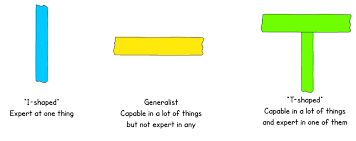The "Jack of All Trades" worker
The Increasing Demand for Hybrid, ‘T-Shaped’ Workers
Excerpt:
Across a variety of occupations and industries, many highly specialized workers are being replaced by problem-solving generalists. Higher productivity and lower costs, or doing more with less, are some of the reasons for this change. Other important reasons are the increased complexity of products and systems and the unanticipated problems that often follow.
The USS Gabrielle Giffords offers a good illustration of the important changes taking place in the U.S. Navy—and in the world of work in general. The ship was designed to operate with a crew of 40 people, the Atlantic reports in a recent article, "a far cry from the 350 aboard a World War II destroyer." That means each crew member needs to be a jack of all trades.
...
The concept of hybrid or T-shaped workers was first introduced around 25 years ago as a metaphor to describe the kind of individuals sought by the Navy and many other organizations. The vertical stroke in the letter T represents a depth of skills and expertise in one or more specific fields; the horizontal bar implies broad multidisciplinary and social skills, as well as the ability to collaborate with experts across disciplines to jointly solve complex problems.
T-shaped skills are increasingly valued in the marketplace. Business schools, for example, have been emphasizing the importance of critical thinking and creative problem-solving that we generally associate with the liberal arts. ... Why are seemingly soft, broad skills so valued in today’s business environment? What’s wrong with I-shaped workers with strong individual skills? There are multiple answers to these questions. Hard skills tend to be deep but narrow. Their half-life is getting shorter. The more specific and concrete the skills, the more they are prone to be automated or significantly transformed by advanced technologies such as artificial intelligence, making it necessary for workers to be flexible enough to keep adapting to the continuing changes in the workplace.
Moreover, teamwork is increasingly important in our fast-changing, complex world. If the members of a team all have strong individual skills, it’s often hard for them to collaborate, as they may each also have strong individual points of view. Effective collaboration requires a combination of social, communications and other soft skills that I-shaped workers may not quite have but T-shaped workers do.
Comment:
- Kathee and I are "T-Shaped"
- The ministry could be transformed by this approach!



